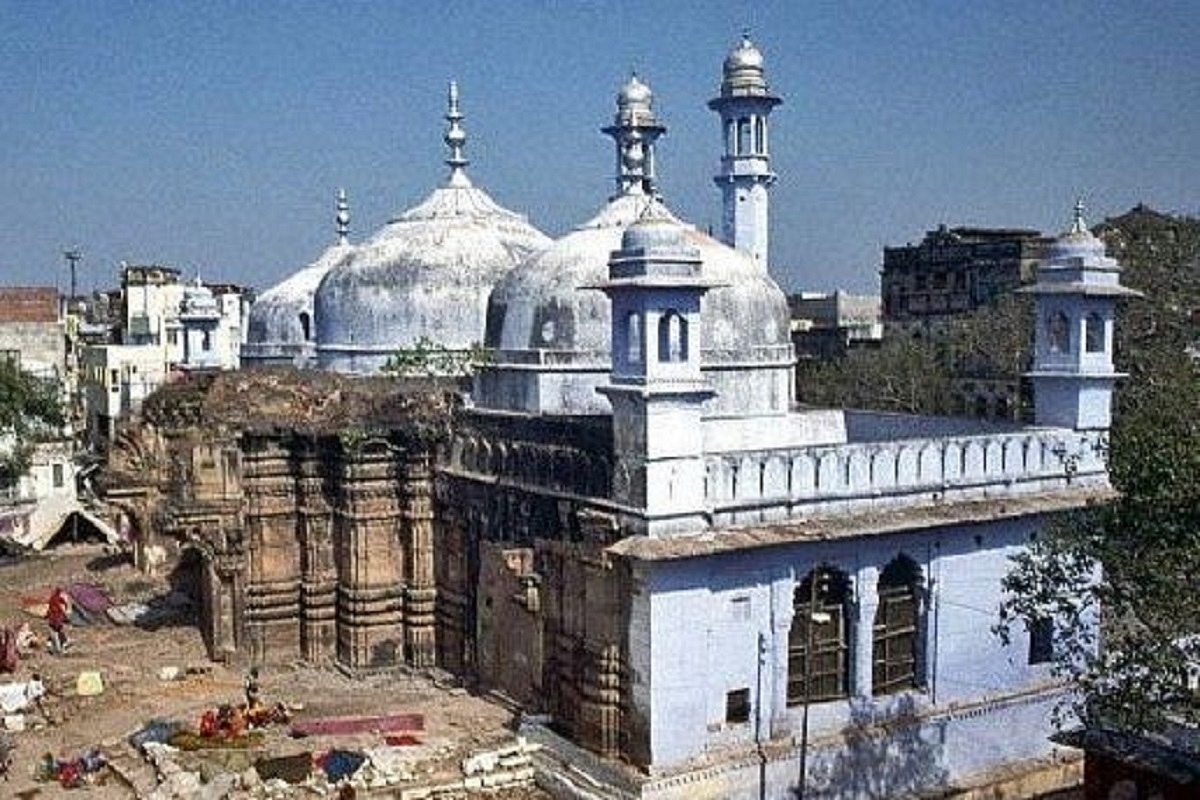Culture
Gyanvapi–Shringar Gauri Temple Complex Video Survey Controversy: Everything You Need To Know

Disputed Gyanvapi Mosque (Pic Via Wikipedia)
The atmosphere around the Kashi Vishwanath temple had become tense for some time on 7 May as a court commissioner's team was stopped from conducting a video survey of the Gyanvapi–Shringar Gauri temple complex by a group of Muslim men.
The survey and videography were being conducted under the direction of the Varanasi district court by a team consisting of court's commissioner Ajay Kumar Mishra and other lawyers.
A history of the Gyanvapi: The Gyanvapi Mosque complex is a disputed structure that was constructed by the Mughal emperor Aurangzeb over the ruins of the desecrated ancient Kashi Vishwanath Temple after it was defiled several times by Islamic rulers like Qutb al-Din Aibak and Aurangzeb.
Till this day, parts of this ancient temple are clearly visible on the outer walls of the mosque. The statues of the bull Nandi and Maa Shringaar Gauri can be seen even from a distance.
The present temple where devotees can perform the puja and prayers, the Kashi Vishwanath Temple complex adjacent to the disputed mosque, was built by Ahilya Bai Holkar of Indore in 1780.
However, the puja at Maa Shringar Gauri Temple, on the western side of the disputed Gyanvapi Mosque was restricted in the wake of the Babri Masjid incident in 1992. The ongoing case is related to a plea regarding the removal of this very restriction.
Why the survey?
In an order passed on 26 April, the court of Civil Judge (Senior Division) of Varanasi, Ravi Kumar Diwakar, had asked the survey and videography to be completed after Eid and before 10 May.
The court's order came after a plea was filed last year on 18 April by Rakhi Singh, Sita Sahu, Manju Vyas, Rekha Pathak and Laxmi Devi, seeking permission to worship and perform rituals towards deities located on the outer facade of the disputed structure: Ganesh, Hanuman, and Nandi. The plea by these Delhi-based women also sought to prevent the opposing parties from causing any damage to the idols.
On 12 April, Anjuman Intezamia Masjid (AIM) Committee moved the Allahabad High Court against Justice Diwakar's order, but the HC dismissed their appeal on 22 April.
Disregarding the court's orders, the AIM managing committee said, "We will not allow anyone to enter the mosque for videography and survey. The managing committee of the Gyanvapi Mosque will oppose this decision of the court. This decision will be opposed constitutionally."
VHP's national spokesperson Vinod Bansal termed AIM's declaration as "contempt of court". He further asked, "How can they refuse to follow the court's order and (not) allow the court-appointed commissioner to conduct videography and survey inside the Gyanvapi Mosque's premises. What is it that you (AIM) want to hide? This (mosque) is not a restricted area for the court."
Survey stopped midway: Accordingly, 6 and 7 May were designated as the dates for conducting the survey and videography by the court's commissioner and team. Amidst the heavy police deployment, they conducted the exercise in areas outside and surrounding the Gyanvapi structure on Friday (6 May).
For the next day, the team fixed that they would enter the barricading and go inside the mosque for the survey and videography.
However, the next day, on 7 May, when the team tried to access the Gyanvapi complex to conduct an internal survey and videography of the structure, people from the Muslim community stood at the door and stopped their entry of the survey team. It was also reported that the police had to intervene to disperse the crowd that began sloganeering.
The surveyors said that they discovered two ancient worn-out swastikas amongst several other Hindu symbols in the Gyanvapi complex.
What are both sides saying now?
Vishnu Jain, the counsel for petitioners, said that the Muslim side was attempting to delay the proceedings of the survey team and stop its entry inside the mosque.
On the other hand, the counsel for AIM, Tauqir Khan, raised fingers at the impartiality of the court's commissioner.
AIM joint secretary SM Yaseen proclaimed that "only Muslims and security personnel can enter the masjid" and that they have no objection to the team conducting the survey outside the mosque.
Another counsel for AIM, Abhay Nath Yadav, said that he opposed the survey inside the mosque on the grounds that the team did not have the court's order to conduct videography inside the mosque's premises.
Introducing ElectionsHQ + 50 Ground Reports Project
The 2024 elections might seem easy to guess, but there are some important questions that shouldn't be missed.
Do freebies still sway voters? Do people prioritise infrastructure when voting? How will Punjab vote?
The answers to these questions provide great insights into where we, as a country, are headed in the years to come.
Swarajya is starting a project with an aim to do 50 solid ground stories and a smart commentary service on WhatsApp, a one-of-a-kind. We'd love your support during this election season.
Click below to contribute.
Latest